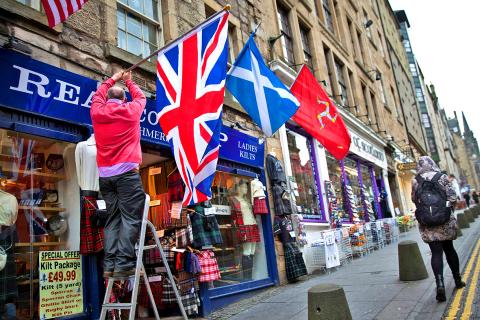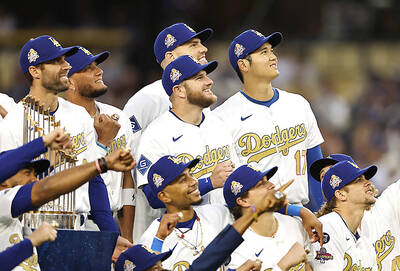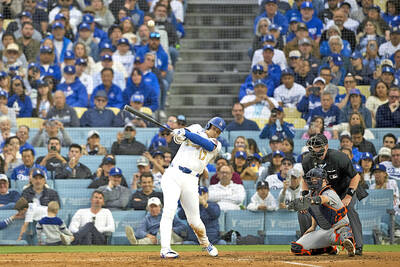After 26 years guiding Manchester United, Alex Ferguson knows better than most that one should always think carefully before breaking up a winning team. Perhaps that helps explain why he donated money to the campaign urging voters in his native Scotland to say “no” to independence in the historic ballot this week.
Because, when teamed together in sports — notably at the Olympics — Scottish, English, Welsh and Northern Irish athletes are proven winners, often a world-beating combination. Britain’s most decorated Olympian is a Scot, track cyclist Chris Hoy. Fact is, if the Scots pull out, what remains of Team Great Britain will not be quite so great.
The future of sports in Scotland and how competitive it might be as an independent nation probably will not be foremost on voters’ minds today. They have got bigger questions — Can we keep the pound sterling? Remain in the UN, the EU and NATO? Finance and defend ourselves? — to weigh in the potential break-up of their 307-year-old union with England.

Photo: Bloomberg
Some athletes might jump at the chance to compete with the Saltire, the Scottish flag, on their jerseys and hear Flower of Scotland played at medal ceremonies.
“We believe very strongly that the prize of being an athlete competing for the first time for Team Scotland in the Olympics and Paralympics will be something that is hard to resist for the vast majority of athletes,” pro-independence Scottish politician Shona Robison said.
Robison, who also serves as the Scottish government’s minister for sport, was speaking in a telephone interview.
For Scots teamed with non-Scots, who get British funding and train in England with non-Scots coaches, unpicking such links could be tough. Athletes will not be forced to join Team Scotland, so some might prefer to stick with the “status quo” in Team Great Britain, if they can, as the easier and possibly safer option.
Take Luke Patience, one of Britain’s top Olympic sailors. Born in Aberdeen, Scotland, his partner in the 470 class of dinghies is Elliot Willis, from Kent in southern England.
They are competing this week at the world championships in Spain, a qualifying event for the 2016 Olympic Games in Rio de Janeiro. Patience won Olympic silver teamed with another Englishman, Stuart Bithell, at the 2012 London Games. As a potential top competitor for Great Britain in 2016, Patience also gets a slice of the £25 million (US$40 million) Britain’s funding body for elite sport allotted to sailing to harvest more medals in Rio.
Would Patience give up all this to represent an independent Scotland? He would not comment.
“Sorry, it is not something that I wish to speak about during my Worlds. Perhaps afterwards,” he said on Twitter in response to reporters’ questions.
Still, it sounds anything but a straightforward choice.
“Great Britain has a lot more strength than Scotland does, just from pure numbers,” said Susan Egelstaff, who competed in badminton both for Scotland and, at the London Games, for Great Britain.
She also spoke to reporters in a telephone interview.
“If I was in a team with English people, I’d be worried about Scotland going independent,” she said.
And if Scots become Olympic adversaries, instead of allies, would English coaches still work and share training secrets with them?
One of the coaching wizards behind all six of Hoy’s Olympic golds — from Athens in 2004, Beijing in 2008 and in London — was an Englishman who grew up in Wales, Dave Brailsford. He oversaw the so-called “marginal gains” philosophy that helped turn British cyclists into Olympic champions — the idea being that many small improvements, even minutiae like making athletes wash their hands properly to prevent illness, can all add up to big performance gains.
Hoy is retired. When the next Hoy comes along, it would be self-defeating for Great Britain to help him or her, or any Scottish adversary, if they are going to compete for an independent Scotland.
“A lot of Scottish athletes train down south. Would that be open to them if Scotland became independent, if Scotland was a separate country?” Egelstaff asked.
“You would guess England probably wouldn’t be quite as accommodating,” she said.
Robison argued against concerns that athletes in an independent Scotland could want for funding, coaching and facilities, saying: “We will make sure that our athletes absolutely receive the support that they require to enable them to compete at the highest level.”
Just since World War II, Britain has collected more than 400 medals at summer Olympics, dozens of them won by Scots. That is a rich history of shared achievement and emotion.
For those growing up south of the border, it will barely have registered that the likes of Allan Wells, 100m champion at the 1980 Moscow Games, and swimming triple medalist David Wilkie were Scots. To many Britons, they were simply British champions. And the story of flying Scotsman Eric Liddell, 400m champion in 1924, will have moved anyone who watched Chariots of Fire, not simply moviegoers north of the border.
Sporting success makes countries feel good about themselves. The same will be true for Scotland if it becomes independent. Scottish medalists in Rio or later games will be nation builders. For this reason, if Scotland votes “yes,” we should all wish them well.
“The history, whether that’s sporting or otherwise, that has been shared is not something we want to dismiss in any way. It’s just that we want, going forward, to start a new period, a new story, a new chapter of Scotland’s future,” Robison said.
Because this would be a peaceful separation, without the bloodshed that divided other nations and led to the likes of Serbia or Croatia now fielding separate Olympic teams, it would be nice to think that Britons would still cheer for their Scottish cousins, at least for old times’ sake.
Unless, of course, they are competing against Britain.

Shohei Ohtani and Clayton Kershaw on Friday joined their Los Angeles Dodgers teammates in sticking their fists out to show off their glittering World Series rings at a ceremony. “There’s just a lot of excitement, probably more than I can ever recall with the Dodger fan base and our players,” manager Dave Roberts said before Los Angeles rallied to beat the Detroit Tigers 8-5 in 10 innings. “What a way to cap off the first two days of celebrations,” Roberts said afterward. “By far the best opening week I’ve ever experienced. I just couldn’t have scripted it any better.” A choir in the

After fleeing Sudan when civil war erupted, Al-Hilal captain Mohamed Abdelrahman and his teammates have defied the odds to reach the CAF Champions League quarter-finals. They are today to face title-holders Al-Ahly of Egypt in Cairo, with the return match in the Mauritanian capital, Nouakchott, on Tuesday next week. Al-Hilal and biggest domestic rivals Al-Merrikh relocated to Mauritania after a power struggle broke out in April 2023 between the Sudanese army and a paramilitary force. The civil war has claimed tens of thousands of lives and displaced more than 12 million people, according to the UN. The Democratic Republic of the Congo-born Al-Hilal

Shohei Ohtani, Teoscar Hernandez and Tommy Edman on Thursday smashed home runs to give the reigning World Series champions the Los Angeles Dodgers a 5-4 victory over Detroit on the MLB’s opening day in the US. The Dodgers, who won two season-opening games in Tokyo last week, raised their championship banner on a day when 28 clubs launched the season in the US. Dodgers manager Dave Roberts shuffled his batting lineup with all four leadoff hitters finally healthy as Ohtani was followed by Mookie Betts, then Hernandez and Freddie Freeman in the cleanup spot, switching places with Hernandez. “There’s a Teoscar tax to

Matvei Michkov did not score on Monday, but the Philadelphia rookie had a hand in both goals as hosts the Flyers earned a 2-1 victory over the Nashville Predators. Ryan Poehling and Jamie Drysdale got the goals for the Flyers (31-36-9, 71 points), who won their third straight. Michkov and Travis Konecny assisted on both. Ivan Fedotov stopped 28 shots to earn his first win since March 1, ending a personal six-game losing streak. Zachary L’Heureux got the lone goal for Nashville. Michael McCarron and Brady Skjei got the assists for the Predators (27-39-8, 62 points), who have just four goals in their